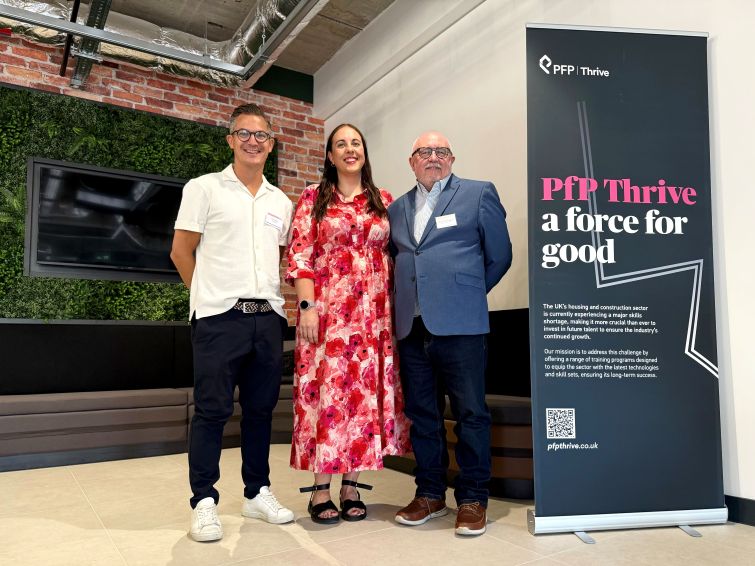“We are the problem,” say industry leaders debating future of housing workforce
Devonshire Group welcomes new chief financial officer
Chamber urges MPs to revise Employment Rights Bill to support East Midlands businesses
The East Midlands Chamber has written to MPs, urging immediate amendments to the Employment Rights Bill currently progressing through Parliament. The Chamber argues that, in its present form, the Bill could impose additional financial strain on businesses, particularly small and medium-sized enterprises (SMEs) still recovering from the impact of the 2024 Chancellor’s Budget and the new tax regime introduced in April.
The Chamber’s call comes as local businesses continue to report declining confidence, with recruitment attempts dropping by 7% over the past three quarters, as per the Chamber’s Quarterly Economic Survey. There is also a notable 15% reduction in the expectation of profitability growth for the year ahead. Amid rising concerns over corporate tax, these developments indicate a fragile economic outlook for the region’s businesses.
East Midlands Chamber urges government action as unemployment rises to 5%
The East Midlands Chamber has called for government action as unemployment in the region rises to 5%, exceeding the national average. The latest figures from the Office for National Statistics show the regional unemployment rate is the highest since mid-2024, with an increase of 0.3% from the previous quarter.
The Chamber has emphasised the need for supportive policies to aid businesses, including amendments to the Employment Rights Bill currently under review in the House of Lords. They are also urging that further tax increases in the upcoming Autumn Budget do not burden businesses.
According to the Chamber’s latest Quarterly Economic Survey, only half of businesses in the region are actively recruiting, representing a 7% decline over the past three quarters. Additionally, expectations for workforce growth have fallen sharply, with only 20% anticipating an increase in staff numbers. This dip in recruitment efforts and growth expectations reflects broader concerns, including rising operational costs, such as higher National Insurance contributions and the increased national living wage.
The Chamber warns that these challenges, combined with soaring inflation at 3.6%, could further strain businesses, tiny and medium-sized enterprises (SMEs). The Employment Rights Bill, if passed without amendments, is expected to introduce additional complexities around employment contracts and statutory sick pay, potentially leading to disputes and claims. The Chamber has urged policymakers to prioritise business needs and make necessary amendments to ensure the region’s firms can continue to thrive.
Great British Energy launches £10m funding for community facilities
Great British Energy has unveiled a £10 million funding initiative aimed at reducing energy bills for community facilities across the UK. The funding, part of the government’s clean energy mission, will support a range of public buildings, including libraries, fire stations, care homes, and leisure centres, to cut energy costs and boost local economies.
The initiative will see mayoral authorities receive grants for clean energy projects, including rooftop solar installations on care homes in Merseyside, leisure centres in Yorkshire, and community buildings across Greater Manchester and West Yorkshire. The projects are expected to generate £35 million in lifetime savings, enhance energy security, and create local employment opportunities.
In addition to solar panels, the grants will fund energy storage batteries and electric vehicle (EV) chargers, with a focus on enabling communities to store renewable energy and utilize it efficiently. The funding builds on Great British Energy’s ongoing efforts to reduce energy costs for public services, with solar panels already installed on 11 schools and plans to expand to 200 schools and hospitals.
The initiative aligns with the government’s broader mission to deliver cleaner, more affordable energy by 2030, contributing to long-term energy security and creating lasting economic benefits for communities.
Top tips for entering the East Midlands Bricks Awards 2025
- Make your nomination compelling – focus on what sets your entry apart, highlighting a business or project’s unique impact and innovative aspects, detailing how it pushed boundaries, overcame problems or challenges, and achieved significant results.
- Less is more – as often judges have to read a large number of nomination forms, no one wants to read “waffle” or an excessive use of jargon in an award entry, so be concise and specific with what you write.
- Use facts, statistics and key examples that support why a project, person or business should win an award, as they will make any statement you make much stronger. Including supporting pictures, video or documents where appropriate is also welcome and can provide additional context and evidence of your achievements.
- Make sure to read the criteria carefully to be sure that your nomination does in fact fit what is being looked for. Why not reflect on last year’s winners to get an idea of whether your nomination reflects a certain category’s requirements.
- Finally, proofread your nomination and submit it in plenty of time!
- Contractor of the Year
- Developer of the Year
- Architects of the Year
- Most Active Agent
- Deal of the Year
- Residential Development of the Year
- Sustainable Development of the Year
- Commercial Development of the Year
- Excellence in Design
- Responsible Business of the Year
- Overall Winner (this award cannot be entered, with the Overall Winner selected from those nominated for the occasion’s 10 other categories and receiving a grand prize of a year of marketing/publicity worth £20,000, with the opportunity to split or gift the marketing to a charity of your choice).
Nominations will close on Friday 15th August.
A highlight in the business calendar, winners will be revealed at the East Midlands Bricks Awards’ 10th annual awards ceremony on Thursday 2nd October, at the Trent Bridge Cricket Ground – an evening of celebration and networking with property and construction professionals from across the East Midlands. Attendees will also hear from Councillor Nadine Peatfield – Leader of Derby City Council, Cabinet Member for City Centre, Regeneration, Strategy and Policy, and Deputy Mayor of the East Midlands – our keynote speaker.Tickets can now be booked for the East Midlands Bricks Awards 2025, click here to secure yours.
Connect with local decision makers over nibbles and complimentary drinks while applauding the exceptional companies and projects in our region.
New for this year, all entrants will also have the opportunity to be featured on our dedicated nominee showcase on the East Midlands Business Link website, providing space for marketing your achievements.The East Midlands Bricks Awards 2025
What: The East Midlands Bricks Awards 2025 When: Thursday 2nd October (4.30pm – 7.30pm) Where: Derek Randall Suite, Trent Bridge Cricket Ground, Nottingham Keynote speaker: Councillor Nadine Peatfield – Leader of Derby City Council, Cabinet Member for City Centre, Regeneration, Strategy and Policy, and Deputy Mayor of the East Midlands Tickets: Available here Dress code: Standard business attire Thanks to our sponsors:









To be held at:

Nottingham College forms strategic partnership with DeWalt
Nottingham College has teamed up with DeWalt, a leading UK power tool brand, to provide construction students with valuable industry exposure. The collaboration will support over 100 students across carpentry, joinery, plumbing, and automotive courses, offering hands-on workshops, technical demonstrations, and significant equipment donations.
This partnership aligns with Nottingham College’s commitment to strengthening industry ties. The college’s Basford campus, recently enhanced by the £6 million Construction Skills Centre, is further supported by DeWalt’s contribution, adding to the resources available for students. The college is also investing in its Green Skills Centre to prepare students for careers in renewable technologies.
The partnership aims to bridge the gap between education and the construction sector, which is focused on delivering the UK government’s ambitious housing targets. This initiative will equip students with the latest tools and real-world insights to ensure they are ready for the demands of the trade upon graduation.
Nottingham to pilot innovative public restaurant model to tackle food inequality
A new initiative in Nottingham aims to explore the potential of public restaurants to enhance public health by offering affordable, high-quality meals. The project, part of the UKRI-funded DISHED initiative, will see the opening of two pilot public restaurants in Nottingham and Dundee by spring 2026. These restaurants aim to provide accessible, nutritious meals sourced locally, supporting sustainable farming practices and meeting the needs of diverse communities.
The project is a collaboration among the Institute of Development Studies, the University of Nottingham, Nourish Scotland, the University of Sussex, and local partners. It is designed to address the rising challenge of food inequality in the UK, in line with the NHS 10-year plan.
Although public restaurants are not a new concept, the revival of this model in the UK is unique, building on the success of similar initiatives in countries such as Brazil and Poland. These establishments, which will be co-designed with local residents, aim to provide affordable meals that promote healthy eating habits while fostering a sense of community.
Running for 14 months, the pilot will be evaluated for its effectiveness in improving public health and reducing food insecurity. Research will also examine the potential environmental and economic impacts of the model, aiming to offer insights into how public restaurants can contribute to better well-being and a more sustainable food system.
Through this initiative, the project aims to demonstrate the value of providing accessible, healthy food as a public service, comparable to libraries or parks, and the role it can play in enhancing community well-being and public health.












